- Home
- Paula Byrne
Mirror, Mirror Page 3
Mirror, Mirror Read online
Page 3
There are times when I have to administer a finger-wagging to those I love. Madou knows the growl of the Black Dog. Her friends see the relentless energy, the commitment, the long hours, the discipline. I see the days spent in bed, with the drawn blinds and the refusal to eat. I shall have to be firm. This business with the Child is a blow; a set-back. I need to impart some ‘Mother-knows-best’ wisdom.
‘Well,’ she says, wearily. ‘And what do you have to say?’
‘You know perfectly well what I’m going to say.’
‘That everybody worships me. I’m tired of being worshipped. It’s nauseating.’
‘There’s hell to pay if they don’t.’
She smiles.
‘So you think I’m an egomaniac? I work hard to keep everyone fed and clothed. My life is not my own – I belong to my work.’
‘You know what I always say, dearest: work is more fun than fun.’
‘What will my fate be, mirror? I suppose it is written in the stars?’
‘I don’t believe in astrology; the only stars that I can blame for my failures are those that walk about the stage.’
She laughs. I can always make her laugh. She looks across to the window, and the inky-black night. It’s nights like these that make her feel far from home. A necklace of bright stars arcs around the sky.
She lights a cigarette and blows blue smoke into my face. She smokes slowly and methodically, no matter how much nervous strain she feels. I leave her to her thoughts. She stubs out her cigarette, sets the alarm to 4.30, turns out the lamp, and slips into bed.
Stage Fright
In the morning, Mother called for me, and I breathed not a single word for fear she would remember Mo’s admonitions, and send me to school. It was freezing cold as we climbed into the studio car; a reminder of the desert that Hollywood was built upon. I had learned to dress with several layers, shedding each skin as the sun rose and became scorching hot. I looked like a roly-poly caterpillar; a look not enhanced by Mother plonking a beige knitted woolly hat on my head.
It was pitch dark on the lot, except for the street lamps, which lined Dressing Room Row. Back in her dressing room, the lovely aroma of greasepaint, coffee and Danish pastries filled the air. Nowadays, people ask me if I hated my life then, but, no, I loved it. Sure, I was sometimes lonely, but never, ever bored. Besides, back then, I knew no other life. Even now, the smell of greasepaint mixed with coffee takes me right back to those days, and the memories are warm and comforting. Bodies betray us.
We sprang into action; we knew our duties. That day, Mo was shooting an important scene; the Red Queen’s inspection of her Russian army. Mother would look her most beautiful, but there was much work to be done.
I placed her ashtray on a side table and brought a fine-boned china cup and saucer for her coffee. Mother undressed and was wrapped in a white cotton robe. Hair first. Always hair first. Nellie brushed her hair away from her face, twisting and plaiting with expert hands. Then Dot began her work. Nobody spoke. All was quiet concentration. I thinned out the eyelashes and handed them to Dot with the special glue. Mother scrutinised her face in the mirror. She took a hairpin, dipped it in white greasepaint and smeared it along the waterline of her eyes. They grew larger, magically. Then, the lips. The perfect Cupid’s bow.
Finally, it was time for the review dress. It was the green velvet one we’d seen in the sketch that first day. Edged with mink. Travis had excelled himself. Everyone would remember this dress. Garbo would be mad as hell when she saw it. Travis had created an oversized muff that matched the trim and the hat. Mother was right to insist that her hair should be pulled back, so the Cossack hat, set at a rakish angle, did not detract from the face. On anyone else the huge hat would be absurd. She had never looked more ravishing.
How to transport her to the soundstage, when the dress was so wide she could only exit the door sideways? A horse and cart were sent to her dressing room. I leapt forward to help her into the cart.
‘No, Angel. You must not touch the velvet or it will leave finger marks.’
Travis obliged, wearing special gloves. There was a special bucket seat at the back of the cart for me. Mother stood erect, holding onto a rail. The horse set off at a snail’s pace, transporting his most precious cargo.
When she entered the soundstage, the crew burst into spontaneous applause. Piercing whistles reverberated around the set. A film crew has seen and heard it all. They are tough, hard to please, impressed by nothing. Mother bestowed a tiny smile in grateful acknowledgement. Mo took her hands and kissed them reverently. Then he led her to the set. I followed behind, curious to see Mo’s latest creation. It was the most terrifying thing I’d ever seen.
Hundreds of grotesque, malformed gargoyles and hobgoblins writhed and screamed, or smirked insanely. They lined the doorways, corridors and tables of the Imperial Palace. Oversized Byzantine saints and martyrs glared menacingly from great heights. Wooden crucifixes with emaciated male figures peeked out between huge stone pillars. Flickering candles in iron-branched candelabras created shadows of frightening intensity.
Worst of all were the El Greco skeletons: they twisted over mantels, peered through windows; macabre guests at the long banqueting table, bent over bowls of rotting, waxen food. The figures were draped in mouldering shrouds and grave clothes, their lean fingers reaching out to me. On the wall, near the door, I saw a dried, withered body of a child hung up by its hair. On a pedestal, I saw a screaming man being forcibly sodomised by a metal pike.
Cleverly, these corpses only served to highlight Madou’s ethereal beauty, so she had no fear of them. Not that anything or anyone could inspire fear in my mother. As for worry about her small daughter witnessing this set of cruelty, she had no such concerns.
Nor did she need to fear the width of the iron doors: they were gargantuan. Looking back with adult eyes, I know that those doors were gigantic! It took at least five people to open and close them, so heavy they were. The imperial throne was shaped into a double-eagle, and there was a huge mirror curved into a winged gargoyle.
Finally, Mo pointed to his living sculpture: three topless maidens, looped by their wrists to a horizontal cartwheel, twirled their contorted bodies around and around in a slow dance like erotic trapeze artists. Mother did not flicker.
‘Mo, it’s superb. But I want to see my troops.’
First, she called for her special huge mirror, and it was rolled on, cables coiled around its base, snake-like. When the lights were plugged in, she looked at her reflection. A nimbus of light surrounded her face.
The Red Queen in lush green velvet. Mo kissed the back of her neck – looked at her in the long mirror, and smiled as he went back to work.
Madou was incomparable in that scene. Hundreds of handsome Cossacks created two straight lines. If she felt nervous, it did not show. She walked between them, to inspect her guard, staring intently at their crotches. She halted and looked down at one of the troops, talking to his trousers, and not his face, saying, ‘Hmm, you’re new here.’
When a sword was pushed into her abdomen, she purred, ‘Is that your sword, or are you just pleased to see me?’
She was magnificent, electrifying. She was in command. The spoilt German bride, transformed into an empress, ready to defeat her faithless, gormless husband and his army. Every male gaze was turned upon her, longing to kiss her hand, ready to die for their queen.
Then she turned, picked a piece of stray hay from a bale, and placed it seductively between her lips. She sucked the straw, staring boldly at her director. Teasing him, taunting him. He had not instructed her to do this. He who controlled her every movement, every gesture. I could tell by his face that she had overstepped the mark. There was a stunned silence. He stared at his star. She held his gaze, cool and still.
‘Cut. Print.’
This Time Tomorrow
Tonight, back home, they quarrel fiercel
y. He stalks over to her desk, where he finds a love letter. She sits, with her stillness, looking at her reflection, while he rages behind her, waving the letter, with a theatrical flourish worthy of a Drury Lane actor. I have heard this all before. It is a well-rehearsed narrative. I am the only witness, the sole audience member, forced to endure this man’s appalling arrogance.
MO: It was I who found you on the filthy streets of Berlin and brought you to Hollywood. My mistake was to fall in love. I ought to have known that you were unfaithful to the core.
MADOU: You knew about my history before you met me.
MO: Yes, I saw you posing for photographs with violets and lavender at your groin. I know all about Gerda. And that other woman who sang that song, Margo. Margo Lion.
Yes, he knew all about them. That stupid song they would sing at the cabaret. What was the song?
MADOU: ‘My Best Girlfriend.’
MO: Yes, that absurd song. Drawing attention to yourself in that revolting manner.
MADOU: Why don’t you stop bouncing up and down like a rubber ball.
MO: So it was Berlin. I know you were curious, and wanted to try everything, but don’t forget it was my idea to introduce you to Hollywood with that Sapphic kiss. Full on the mouth. Dressed in men’s evening clothes, and top hat. My idea. Not Yours. I changed your name from Maria to Joan.
As he continues his ranting monologue, her face turns very still. Only her eyes move. I know she is thinking over the Berlin scenes she has talked of so often when we are alone. Her mind is drifting back to the bare-breasted whores who chatted with clients at the Café Nationale. The rent boys, on every corner, flicking their whips, dressed in leather and feathers. The White Mouse, on the Behrenstrasse, where Anita Berber danced her naked dances of Horror, Lust and Ecstasy, wearing her drugs in a silver locket around her neck. The little hotels in the Augsburger Strasse, where you could rent a room for an hour. God, how she missed that life. So much colour, so much excitement.
Mo was a fool. She alone had taken her inspiration for Lola Lola from the cross-dressed boys from the cabaret. One of the blonde transvestites she especially admired wore ruffled panties, a feather boa, and a white silk top hat. The boys treated her like a sister, and they went dancing; she in her men’s tails and top hat. She liked to wear her dead father’s monocle. It made her feel close to him.
Of course she preferred women, but they were impossible to live with. Mo knew about her past. Why did he insist on being so bourgeois? She lights a cigarette and turns around.
‘You know, Mo, in America, sex is an obsession, in the rest of the world it’s a fact.’
He suddenly bursts into laughter. She can always make him laugh, even when he’s angry with her. He bends down to kiss the nape of her neck. He is sorry. He should not have read the letter, which she left open for him to see.
Mo was obsessed by her from the first time he saw her in that beastly revue, Two Neckties. He had almost given up hope of finding his Lola Lola, when, by accident, he saw her in the play. The first time he laid eyes on her, she was standing offstage, leaning by a pillar, and she looked aloof and bored. She spoke only one line. She was wearing a conventional dress, but when she twirled around, she showed her underwear.
But it was her face – that face, so exquisite, but with the promise of devilry. What he loved was her nonchalance, and her cold disdain in the face of the knowledge that a famous Hollywood director was in the audience. She was equally indifferent when he invited her to his office for a screen test. She looked bored, and made no effort to be charming, and that was what interested him, poor little fool.
He asked her to sit on top of a piano and sing a ditty. She complied, but was sullen and dragged on a cigarette, blowing smoke out of the side of her mouth. She was asked to sing a song in English. The pianist, though able, was unfamiliar with the tune, although tried his best to accompany her rather mediocre singing, it must be admitted. Madou knew her limits.
Every time he made a mistake, she berated him, ‘It’s music, remember. Call that piano playing? How can I sing to that rubbish? You’re not playing a washboard, jerk!’ And again: ‘What do you have for brains?’
Pale with anger, she climbed down from the piano, and she slapped him, hard, across the head: ‘And I have to sing this crap – just don’t screw up again, or I’ll kick you.’
She knew that the studio executives, brought over from Hollywood, were horrified by her open contempt for a fellow artist, but Goldberg was delighted. This crass, uncouth, trampy woman was exactly what he had been searching for. He had found his Lola Lola; seducer of men, corrupter of morals, careless, contemptuous and carnal.
Mo knew that she could love no one, only herself. But that skin; white as milk, Parian marble, semi-translucent; pure white and entirely flawless.
He saw that she was so utterly beautiful, even before she was beautiful. He knew what he had to do; he would dominate her with his light to create perfection. That way she would never leave him.
The Lady is Willing
The review scene was the last time that my mother and Mo were really happy. All of a sudden, she had important issues to discuss with her leading man – the man she used to loathe, with fingers like sausages. For days, I was barred from her dressing room. Goulash no longer bubbled on the stove. Nellie kept guard and gave me dollars to spend in the commissary. There was a new chocolate malted that she wanted me to try. On the way, I saw Mr Goldberg. He looked sad.
Was I starving! I ordered hot dogs with onions, mustard, and ketchup; potato chips; corn on the cob, oozing warm butter. I crammed it into my mouth, relishing each morsel, away from Mother’s prying eyes.
‘You want apple pie, honey? Whipped cream and ice cream?’
I nodded. The lady was so nice.
‘It’s good that you enjoy your food, honey. I like to see a young girl who appreciates her food. You want more?’
My empty plate was my answer. I pushed it over the counter before she changed her mind.
People liked to feed me, I guess it’s because they felt sorry for me. The more I ate, the thinner my mother became. I remember when I first began to eat alone. It was that day at the commissary, when the nice lady had pity in her brown, knowing eyes. I felt ashamed. That afternoon, I ate and ate. I took cookies and a huge tub of ice cream, and found a secret corner to eat. I ate quickly, not savouring the taste but stuffing my mouth as though my life depended on it. It felt so good to eat alone. All I could think about afterwards, was when I could eat again. And how I could get the food, without my mother knowing.
And here’s the thing, I got to be good at it. Really good at it. The secrecy was thrilling. I had my favourites: Kraft macaroni and cheese, Wonder Classic white bread, Charleston Chews, Bumble Bee tuna, Lay’s sour cream and onion chips, Wheat Thins, Yodels, Ring Dings, Cheese Nips.
When I had obtained my stash (often via my kindly bodyguard) I would ask permission to go to my bedroom, and then I would turn on the electric fan to disguise the rustle of paper. One night, I ate half a chocolate cake. I especially loved candy, and when I’d finished, I folded the wrappers into tiny squares so that they could be hidden away. No one would know my little secret.
And how could it be bad when it made me feel so good, so warm inside? Here’s the thing: food was my friend. It didn’t insult me, or ignore me, or judge me. It was the gift that kept on giving. The discomfort was a small price to pay, the tightness of the waistband of my dress, which chafed my skin, the back ache, the stretch marks.
Compulsive eating: it creeps up on you, and before you know it, it feels like a thousand lead weights bearing down on you. But by then it’s too late to stop. I ate when I was sad, when I was bored, when I was feeling bad about myself (most of the time), and when I was lonely. Can you imagine how it feels to be a child who is heavier than her mother? Here’s another funny thing about compulsive eating. I truly believed that the more I ate, the more invisible I
would become.
One day, I stole a cookie from my mother’s dressing table. I tried not to look in the mirror, but I swear I heard it say, ‘Go ahead and eat it, porker.’
Mo no longer appeared at the breakfast table for Mother’s scrambled eggs. Never mind, more for me. She glared at me when I had extra helpings, and smoked her cigarette, puffing furiously.
‘A bigger dress size. How can that be?’
Mother is ashamed, but nothing that anyone else says can hurt as much as the things that I say to myself. When I pulled on my bathing suit, over my hips and belly, I tried not to notice the soft rolls of fat. In the blue rectangular pool, I felt light as air. I spent hours floating until the skin on my fingers wrinkled.
I was sure that Mo would be replaced before too long, and I was right. The next morning a dozen long-stemmed red roses appeared in their long, white coffins. American Beauty. Whoops. I waited for the storm.
‘Why can’t the shop girls cut the thorns from the roses? But if they were not stupid, they wouldn’t be working in a florist’s shop.’
The sender of the red roses appeared in her dressing room. She cooked him a perfect omelette in her crinoline and wig, and somehow managed to never get a drop of oil on her dress. The next evening, he appeared at the house of mirrors for her famous pot au feu. Mother looked divine in a Hausfrau apron with a bandana tied around her hair. She removed his shoes, and massaged his feet. I poured the champagne into crystal-cut glasses that sparkled and gleamed. I loved to hear the hiss of the bubbles as they danced around the rim of the coupe. The breasts of Marie Antoinette, Mother said, with a smile.
At dinner, she smiled and tapped her finger on the side of his head: ‘You see, there’s nothing there. Quite empty. Nothing inside that pretty head. Not a single idea, and that’s what I like.’

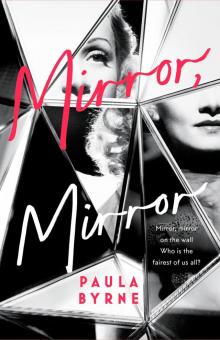 Mirror, Mirror
Mirror, Mirror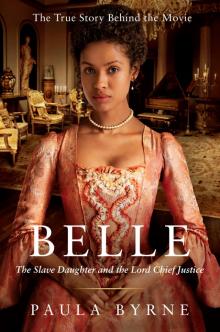 Belle
Belle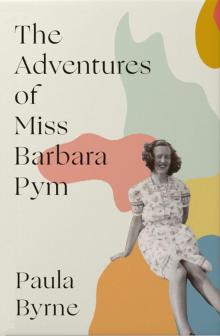 The Adventures of Miss Barbara Pym
The Adventures of Miss Barbara Pym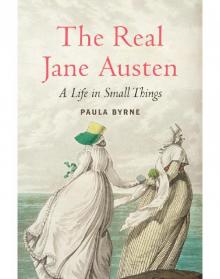 The Real Jane Austen
The Real Jane Austen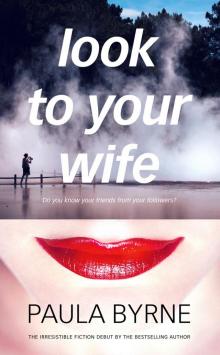 Look to Your Wife
Look to Your Wife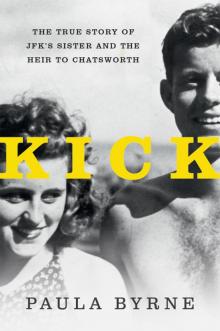 Kick
Kick Perdita
Perdita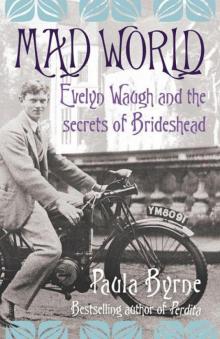 Mad World: Evelyn Waugh and the Secrets of Brideshead (TEXT ONLY)
Mad World: Evelyn Waugh and the Secrets of Brideshead (TEXT ONLY)